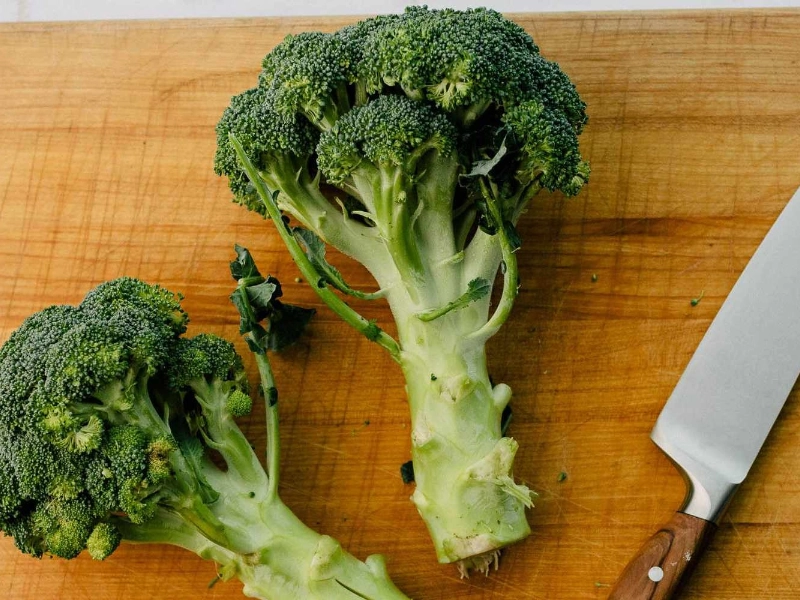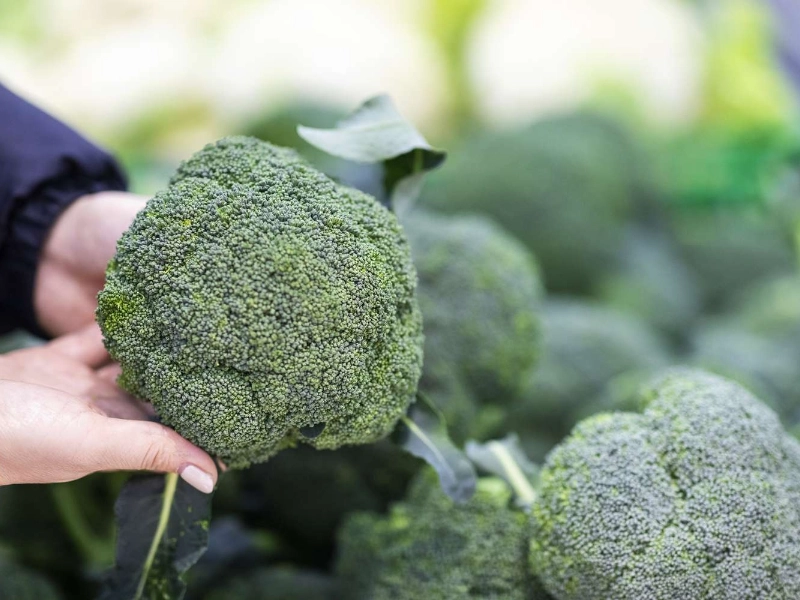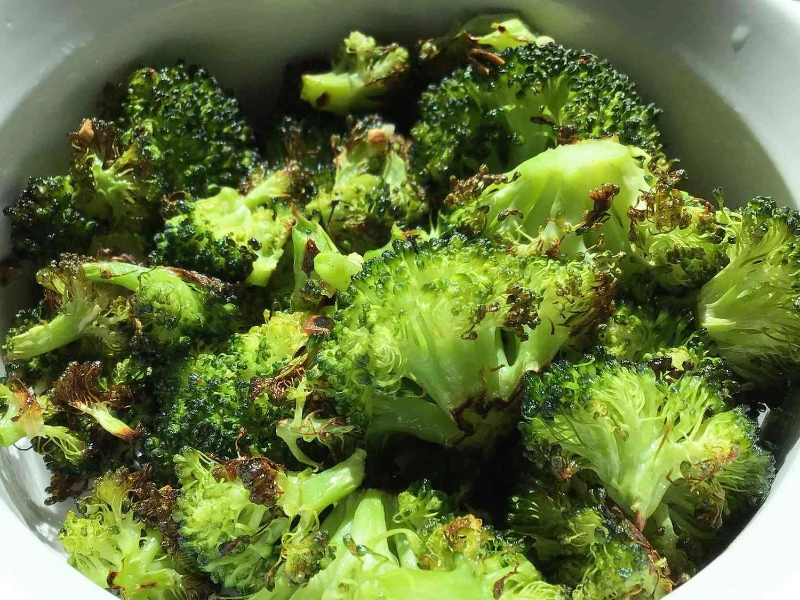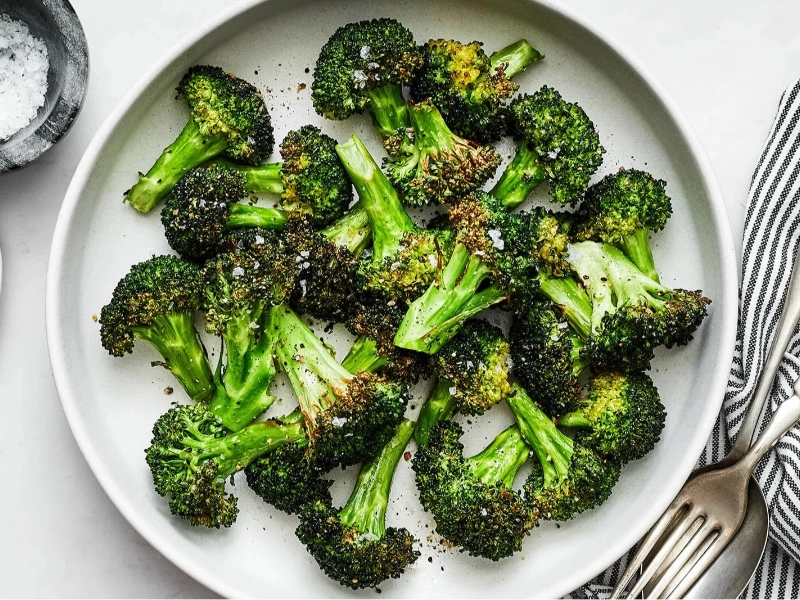Broccoli, a member of the Brassica family, is a nutrient-dense vegetable packed with folate, vitamins, and bioactive compounds. It offers numerous health benefits for women, including lowering the risk of heart disease, protecting eyesight, and potentially slowing the aging process. Enjoy it steamed, roasted, or in salads for a nutritious addition to your diet.

 Among cruciferous vegetables, broccoli is low in calories and high in soluble fiber, promoting digestive health. It is also rich in potassium, magnesium, iron, calcium, and vitamins A, C, and K.
The glucosinolates in broccoli are converted into sulforaphane, a powerful antioxidant that helps reduce inflammation and oxidative stress linked to cancer. Studies show that women consuming more cruciferous vegetables experience a lower risk of developing fatty calcium deposits in the aorta, a major blood vessel associated with heart health.
Among cruciferous vegetables, broccoli is low in calories and high in soluble fiber, promoting digestive health. It is also rich in potassium, magnesium, iron, calcium, and vitamins A, C, and K.
The glucosinolates in broccoli are converted into sulforaphane, a powerful antioxidant that helps reduce inflammation and oxidative stress linked to cancer. Studies show that women consuming more cruciferous vegetables experience a lower risk of developing fatty calcium deposits in the aorta, a major blood vessel associated with heart health.
 Broccoli is an excellent source of fiber, which aids digestion and helps maintain a healthy weight. It contains isothiocyanate compounds like sulforaphane and indole-3-carbinol that enhance detoxifying enzymes and combat oxidative stress, potentially preventing certain gastrointestinal cancers.
Additionally, the carotenoid antioxidants lutein and zeaxanthin in broccoli promote eye health by reducing the risk of age-related macular degeneration and cataract formation. The flavonoid kaempferol may also mitigate the effects of allergens on the intestine and immune systems.
Broccoli is an excellent source of fiber, which aids digestion and helps maintain a healthy weight. It contains isothiocyanate compounds like sulforaphane and indole-3-carbinol that enhance detoxifying enzymes and combat oxidative stress, potentially preventing certain gastrointestinal cancers.
Additionally, the carotenoid antioxidants lutein and zeaxanthin in broccoli promote eye health by reducing the risk of age-related macular degeneration and cataract formation. The flavonoid kaempferol may also mitigate the effects of allergens on the intestine and immune systems.
 Rich in phytochemicals, broccoli contributes to bone health through compounds like glucosinolates, sulforaphane, and indole-3-carbinol. Population studies suggest that higher consumption of cruciferous vegetables correlates with lower rates of atherosclerosis, potentially due to the antioxidant effects of sulforaphane.
Broccoli provides significant amounts of potassium, calcium, and magnesium, along with plant-based protein, making it an excellent option for vegans and vegetarians seeking to enhance their protein intake.
Rich in phytochemicals, broccoli contributes to bone health through compounds like glucosinolates, sulforaphane, and indole-3-carbinol. Population studies suggest that higher consumption of cruciferous vegetables correlates with lower rates of atherosclerosis, potentially due to the antioxidant effects of sulforaphane.
Broccoli provides significant amounts of potassium, calcium, and magnesium, along with plant-based protein, making it an excellent option for vegans and vegetarians seeking to enhance their protein intake.
 Broccoli is loaded with phytochemicals that enhance immune function. Sulforaphane, in particular, reduces inflammation and stimulates antioxidant production in the body. While inflammation is a natural response to injury or illness, excessive inflammation can lead to conditions like heart disease and cancer.
Furthermore, glucosinolates in broccoli convert to sulforaphane in the digestive tract, which has been shown to suppress antibiotic-resistant bacteria, potentially preventing foodborne illnesses. Nutrients such as vitamin C, potassium, folate, and zinc further support overall health.
To maximize the health benefits of broccoli, it's best to consume it raw or lightly cooked, preserving its vital nutrients. Incorporating broccoli into your diet can significantly contribute to women's health and well-being.
Broccoli is loaded with phytochemicals that enhance immune function. Sulforaphane, in particular, reduces inflammation and stimulates antioxidant production in the body. While inflammation is a natural response to injury or illness, excessive inflammation can lead to conditions like heart disease and cancer.
Furthermore, glucosinolates in broccoli convert to sulforaphane in the digestive tract, which has been shown to suppress antibiotic-resistant bacteria, potentially preventing foodborne illnesses. Nutrients such as vitamin C, potassium, folate, and zinc further support overall health.
To maximize the health benefits of broccoli, it's best to consume it raw or lightly cooked, preserving its vital nutrients. Incorporating broccoli into your diet can significantly contribute to women's health and well-being.